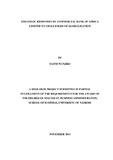| dc.description.abstract | Globalization is a process of interaction and integration among the people, companies
and governments of different nations, a process driven by international trade and
investment and aided by information technology. Globalization has brought competition
to the door steps of most companies in every industry the world over because of many
challenges that come with it. It is an attempt to reduce the vast world to a mere global
village by facilitating interaction of people and business transactions through
technological innovations and scientific breakthroughs. Strategy is a plan to achieve a
goal or objective. It takes into consideration aspects of how, when, where and what
means are going to be taken to achieve the set goals. The process aims at improving the
economic and social well being across the different countries across the globe. The
process of globalization has affected different firms that operate in different
environments. Globalization has been accompanied by advanced technology that has seen
increased use of the internet and improved communication. People as well as
organization can communicate at any time and from anywhere to any person. Through
improved communication, firms have increased their market share especially through the
utilization of electronic commerce. The process of globalization has proved to be very
effective and helpful to some multinational corporations that have been able to increase
their global market shares through internationalization. However, the process has not
been utilized by some organizations especially in third world countries that have found it
costly to acquire new technologies that could meet their objectives. Some of the firms
that have faced many challenges in embracing globalization are commercial banks
operating in Kenya. The latter have not effectively overcome the challenges of
globalization and it is important that they establish the best strategies to use globalization
for their financial benefit. Therefore, a gap exists on the strategic measures that a
financial institution operating locally should take to counter the challenges of
globalization without necessarily trading in the international market. Since none has
written the strategic response on Commercial Bank of Africa, this is the knowledge gap
that this study is trying to fill. The Internet revolution is one such technological
ingenuities upon which globalization has thrived. However, a glaring gap exists on the
strategic measures that a financial institution especially a Bank operating locally should
take to counter the challenges emanating from globalization. The Commercial Bank of
Africa (CBA) which was founded in Tanzania but now operates in Kenya and Uganda
thus becomes the focus organization that the study uses to fill up this knowledge gap. The
research question therefore is: What strategic responses is the Commercial Bank of
Africa putting in place to control the challenges of globalization? The objectives of the
study were to establish the challenges of globalization faced by Commercial Bank of
Africa limited and the strategic responses by the Commercial Bank of Africa Limited to
these challenges. The study used the case study design to gather qualitative data using an
interview guide and it focused on Commercial Bank of Africa Limited. Content Analysis
will be used to analyze the primary data (qualitative analysis). | en |

